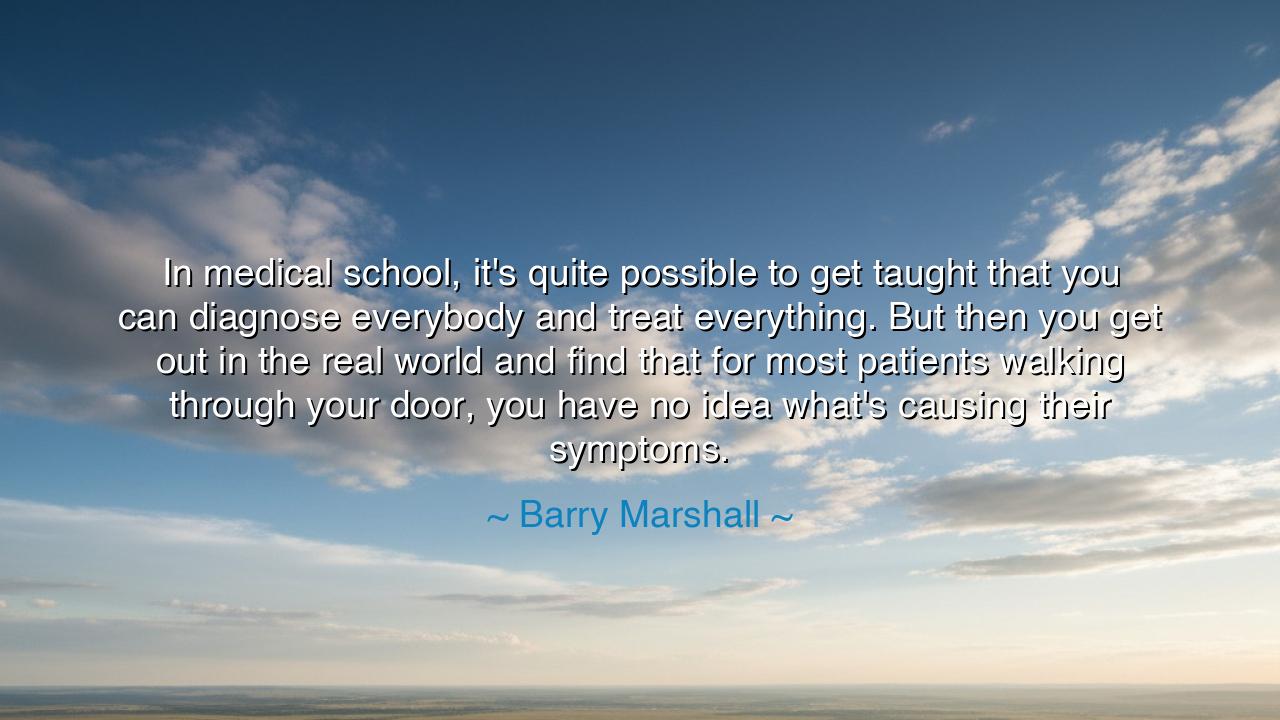
In medical school, it's quite possible to get taught that you can
In medical school, it's quite possible to get taught that you can diagnose everybody and treat everything. But then you get out in the real world and find that for most patients walking through your door, you have no idea what's causing their symptoms.






Hear the voice of Barry Marshall, physician and Nobel laureate, who declared with humility and candor: “In medical school, it's quite possible to get taught that you can diagnose everybody and treat everything. But then you get out in the real world and find that for most patients walking through your door, you have no idea what's causing their symptoms.” These words, though spoken of medicine, resound far beyond it. They remind us that knowledge, however deep, often falters before the mysteries of life. They warn against arrogance, and they call us to humility, patience, and perseverance in the face of uncertainty.
The meaning is plain: in the classrooms of medical school, one learns certainty. Diseases have names, symptoms have patterns, treatments have protocols. The student is taught to believe that every mystery has an answer if only one studies hard enough. Yet when the physician steps into the living world, this certainty dissolves. Patients arrive with strange ailments, elusive causes, and tangled stories of suffering that no textbook ever captured. The young doctor, once proud in knowledge, now stands disarmed before the truth: that human life is infinitely complex, and certainty is a rare gift.
History proves the wisdom of Marshall’s words. Consider his own story: for decades, the world believed that stomach ulcers were caused by stress or spicy food. Yet Marshall suspected otherwise. He believed a bacterium—Helicobacter pylori—was the true culprit. His peers mocked him, his theory dismissed. So convinced was he that he drank the bacteria himself, fell ill, and proved his point. From that act came a revolution in treatment, saving millions from suffering. His journey reveals that medicine, though steeped in science, is also a realm of mystery, error, and discovery. Knowledge is not complete; it must be tested again and again by reality.
There is also a deeper truth: what Marshall describes of medicine is true of all human endeavors. In war, generals may be trained in strategy, yet on the battlefield, plans collapse before the chaos of reality. In philosophy, one may read countless theories of life, but when grief strikes, no page prepares the soul for its weight. Knowledge is powerful, but it is never absolute; reality always retains its power to humble.
Yet this recognition is not despair. It is a call to wisdom. For when we admit that we do not know, we open the door to deeper inquiry. When we confess uncertainty, we become more careful, more compassionate, more attentive to the voices of those we serve. A physician who says, “I do not yet know what ails you, but I will not abandon you,” offers more healing than one who pretends to know and misleads. Thus Marshall’s words remind us that humility itself is a medicine, one that sustains both doctor and patient alike.
The lesson, child of tomorrow, is this: do not mistake knowledge for omniscience. Study diligently, but never imagine that the world will fit neatly into your learning. Be willing to admit what you do not know. When faced with uncertainty, do not retreat into arrogance, but lean into curiosity and compassion. Respect the mysteries of life, for they are the proving ground of wisdom.
To live by this teaching, act with both courage and humility. If you are a healer, remember that your task is not only to diagnose, but to listen, to comfort, to continue seeking even when answers are hidden. If you are a student, honor your teachers but also remember that their wisdom is incomplete. And if you are a leader, never disguise uncertainty with false confidence, for honesty breeds trust. Let Marshall’s words guide you to balance: confidence in what is known, humility before what is not.
Thus, his testimony endures: “You have no idea what's causing their symptoms.” It is not a confession of weakness, but of truth. And in this truth lies strength. For those who accept the limits of knowledge gain the power to seek further, to serve with honesty, and to endure with patience. Let this wisdom be your inheritance—that in every walk of life, the greatest strength is not in pretending to know all things, but in respecting the mystery and pressing forward with courage.






AAdministratorAdministrator
Welcome, honored guests. Please leave a comment, we will respond soon